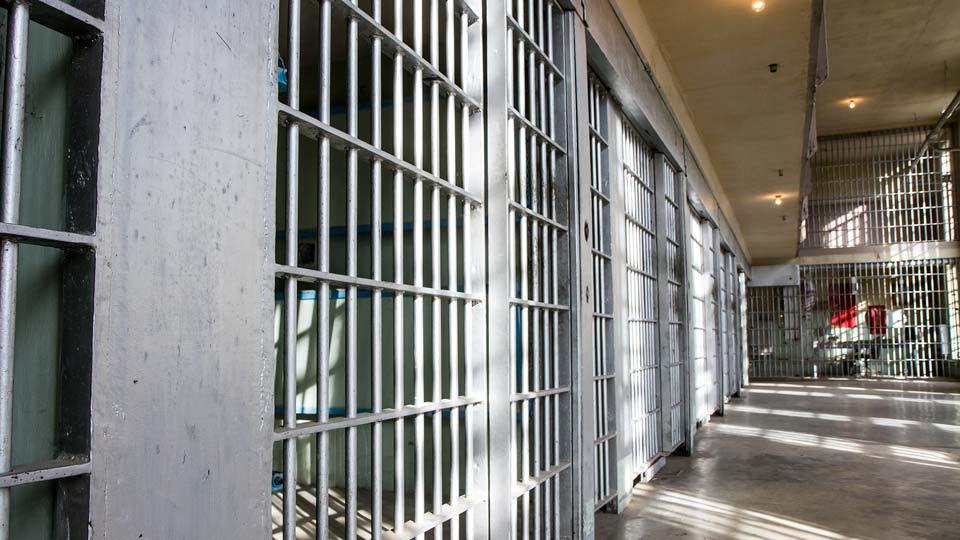‘A slap in the face’: Prisoners, families have hopes dashed by governor’s amendment
Ashley Crocker had a message for Gov. Glenn Youngkin after he signed into law an amendment curtailing the expansion of an earned sentence credit program that would have released hundreds of people currently in state prisons beginning July 1.
“You’re ruining families,” Crocker, of Woodbridge, called out to Youngkin at a political event in Prince William County days after the budget was signed. “Children want their fathers and their mothers to come home.”
The exchange was captured on video by Chari Baker, a criminal justice reform activist from northern Virginia, who had organized a few families to show up at the event and confront Youngkin about the policy change. Baker runs an advocacy organization called Fighting for Reform and a weekly support group for people with incarcerated loved ones. Of the 180 people in the group, she estimates at least 40 have been affected by the policy change.
“I just wanted him to put a face on the decision that he made,” Baker said.
The governor’s amendment to the budget, which the General Assembly approved only two weeks before releases of eligible prisoners were set to begin, narrowed a 2020 law that sought to encourage prisoner rehabilitation by incentivizing good behavior. The legislation allowed prisoners to earn up to 15 days of “good time” credit toward early release for every 30 days served.
Previously, eligible incarcerated people could earn a maximum of 4.5 days of credit every 30 days.
Every Republican, as well as Sens. John Bell, D-Loudoun, Lynwood Lewis, D-Accomack, and Monty Mason, D-Williamsburg, voted in favor of making inmates with mixed sentences — sentences for both violent and nonviolent crimes — ineligible to earn credits.
The governor’s amendment came after Sen. Rob Bell, R-Albemarle, failed to pass legislation that attempted to repeal the entire 2020 law earlier this year during the regular legislative committee process.
Baker’s husband — whose mixed sentences include a robbery charge as well as a firearm possession charge and a probation violation — has served 14 years and was due to be released between August and September as a result of his earned sentence credits. Now he’ll spend another eight years in prison despite having completed his time for the violent offense, according to Baker.
When she spoke to him on the day the budget amendment passed, he was “in such a good mood” that she didn’t have the heart to break the news. When she told him the next day, she said it was “very difficult.”
“He just kind of stared off for a minute and he goes, ‘Are you serious,’” Baker said. “So I kind of had to, explain to him what happened and then he was like, ‘I just knew it was too good to be true.’”
When asked for comment on the impact for families, the governor’s spokesperson pointed to Youngkin’s statements in a recent interview with WRIC.
“The original bill wasn’t meant to accelerate the release of folks who had committed violent crimes,” he told WRIC. “So the bill had an error in the way it was written versus what was intended and what my amendment did was correct the error.”
Del. Don Scott, D-Portsmouth, the House patron of the 2020 bill, also said that he understood how the law’s implementation would work for mixed-sentence prisoners and added that the legislature should trust the state’s investment in correctional facilities.
“Either we believe in rehabilitation or we don’t,” Scott said. “We need to give everyone an opportunity to be rehabilitated if they have served a sufficient amount of time.”
Youngkin proclaimed April 2022 to be “Second Chance Month,” which acknowledged that “criminal justice agencies and reentry service providers play a vital role in enhancing long-term public safety, reducing statewide recidivism rates and decreasing violent crime victimization.”
“If I could sit down with the governor, I would say that we really believed that he believed in second chances, because that’s what he said and this was a prime example of the opposite,” Baker said. “So seeing that was a smack in the face.”
DOC has not come to an exact number of inmates who will be immediately affected by the policy change as of Friday, but estimates it to be between 550 and 560 prisoners who were previously set to be released within the legally mandated 60-day window beginning July 1. Brad Haywood, executive director of Justice Forward Virginia, disputes those figures, saying that the number is closer to 1,000.
DOC Director of Communications Benjamin Jarvela said he’s “seen some of the chatter” about data discrepancies and believes that the “delineating factor is the time frame that you’re talking about.”
The expanded credits served as motivation to avoid infractions and participate in correctional programs in circumstances where “you don’t have a lot of hope,” said Angela Adinolfi, a prison reform activist from Richmond whose husband has been incarcerated since 2013. She estimates her husband would have gotten out in late 2027 instead of mid-2029 for his mixed sentence of a robbery, firearm and abduction conviction. The Department of Corrections estimates that about a total of about 8,000 prisoners will be affected by the policy change applied going forward.
But victims of violent crime, especially those that testify against perpetrators, are often fearful of retribution after a prisoner is released, said Kate Hanger, executive director of the Virginia Victim Assistance Network.
“It is a relief for victims of crime to know that earned sentence credits will not be offered to the violent offender they fear will seek retribution when released,” Hanger said in an email statement. “Our members have reported to us that many of their victims are contacting them with concerns about early release. The victims we serve expect the sentence for the crimes committed against them to be served in full.”
The legislature gave DOC until July 1 to recalculate credits under the new rules, which apply retroactively, and then gave it a 60-day window to release any prisoner whose new release date came before July 1, as well as those whose updated release date fell within that July to Aug. period.
Before the amendment, those with either mixed consecutive sentences or mixed concurrent sentences with a shorter violent conviction than non-violent would have been eligible to earn expanded credits only on the non-violent charges. After the amendment, no prisoner with a mixed sentence is eligible for extra early release credit.
Weneta said that another consequence of the sudden change in policy is that both prosecutors and judges were operating under the assumption that incarceration would be 65 percent shorter than the sentence for many offenders, leading to longer sentences and more plea deals being accepted.
For those who are still getting an early release, Jarvela said that DOC is trying to be mindful in their approach and not “just open the doors and turn 3,200 people out at once” without adequate support and supervision in place.
“Releasing a population of inmates early, many of whom are incarcerated for violent offenses, is not the solution to the growing crime spike across the commonwealth,” Victoria LaCivita, spokesperson for Attorney General Jason Miyares, said in a statement. “This amendment prioritizes public safety and prevents the most violent offenders from being released early from prison, protecting law-abiding Virginians.”
The Virginia State Police’s crime report for 2021 showed an increase of 6.4 percent in homicides and 7.1 percent in violent crime since the previous year.
Baker said she understands the impulse to keep those charged with rape or murder, for example, from getting an even earlier release, but says that a host of offenses—like her husband’s robbery charge for snatching a purse—are also categorized as violent by code.
“The way it was done was wrong,” Baker said. “I just don’t understand why he waited until 10 days prior to it going into effect. I just think that was really harsh.”
Virginia Mercury is part of States Newsroom, a network of news bureaus supported by grants and a coalition of donors as a 501c(3) public charity. Virginia Mercury maintains editorial independence. Contact Editor Robert Zullo for questions: info@virginiamercury.com. Follow Virginia Mercury on Facebook and Twitter.


